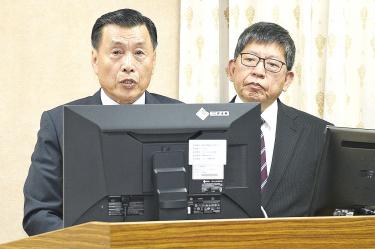A total of 19 Taiwanese hold official posts in China’s military, government or political parties, while another 112 Taiwanese hold sideline jobs in those Chinese agencies, but the government has punished only two people, government agencies said yesterday.
Democratic Progressive Party (DPP) lawmakers yesterday first made the numbers public, while accusing the government of inaction.
DPP lawmakers Wang Ding-yu (王定宇), Lo Chih-cheng (羅致政) and Tsai Yi-yu (蔡易餘) called a news conference yesterday to expose that national security agencies have known of 19 Taiwanese holding an official post at Chinese agencies since 2012.
“Regrettably, since 2012, only two people have been punished according to the law,” Wang said, asking whether the government was attempting to protect those people.
The National Security Bureau in 2012 disclosed that 169 people were holding public office in China, but the number has shrunk to 19 according to Wang’s latest inquiries, he said, questioning the status of the other 150 people.
The bureau has not revealed the identity of the people because under the Personal Information Protection Act (個人資料保護法), the government cannot disclose personal information unless it is a national security matter, Wang said.
However, “those people could become a national security risk or become underground operatives of Beijing,” Wang said.
“The Personal Information Protection Act has become a firewall for these people. [The government] does not publish their details. Does it protect their details, or their working rights in China?” Tsai said.
According to the Act Governing Relations between the People of the Taiwan Area and the Mainland Area (台灣地區與大陸地區人民關係條例), Taiwanese may not hold “household registrations” in China — a euphemism for Chinese citizenship used due to the complex political context across the Taiwan Strait — or they will be deprived of Republic of China (ROC) citizenship and given a fine of between NT$100,000 and NT$500,000.
During a question-and-answer session of the legislature’s Foreign Affairs and National Defense Committee, bureau officials said the number of people taking public office in China has fluctuated and 131 people hold public positions in China, 19 of which are official and full-time positions.
The bureau confirmed that only two people have been punished, not including Lu Li-an (盧麗安), a Taiwanese elected to the Chinese Communist Party’s (CCP) just-concluded 19th National Congress, or her husband, bureau Third Division Director Wang Shao-po (王少白) said.
Asked why only two people have been punished, Mainland Affairs Council (MAC) Deputy Minister Lin Cheng-yi (林正義) said it is difficult to determine whether people actually hold official positions in China, because a person teaching at a Chinese university might also be recognized as such.
The council would revoke the citizenship of any Taiwanese found to have a “household registration” in China or to hold a Chinese passport, Lin said.
The council said it has canceled Lu and her husband’s citizenship, while it would look into other cases of people holding public office in China together with the Ministry of the Interior, Lin said.
Wang said people have to hold Chinese citizenship to hold public office in China and the government should automatically revoke the citizenship of any Taiwanese holding Chinese positions without asking them to provide relevant information.
In a statement issued late yesterday, the council said the two Taiwanese who had been disciplined are holding deputy director positions at a technology development center and an investment development agency of the Chinese government.
As they did not obtain Chinese citizenship, they only received a fine instead of having their ROC citizenship revoked, MAC Deputy Minister Chiu Chui-cheng (邱垂正) said.
Of the remaining 17 people who hold full-time Chinese positions, the council is still investigating seven, while no violation was found in the other 10 cases, the council said.
Regarding the list of 196, the bureau referred to 2012, when one person was found to have violated the law and punished, but no violation was found in the cases of the other 168, whose positions in China were found not be linked to the government, military or political parties, the council said.
Chiu said Lu and her husband were not included to the group of 19 people because they violated a different article of the act, but confirmed that their ROC citizenship has been revoked due to their Chinese citizenship.
Source: Taipei Times - 2017/10/27





















